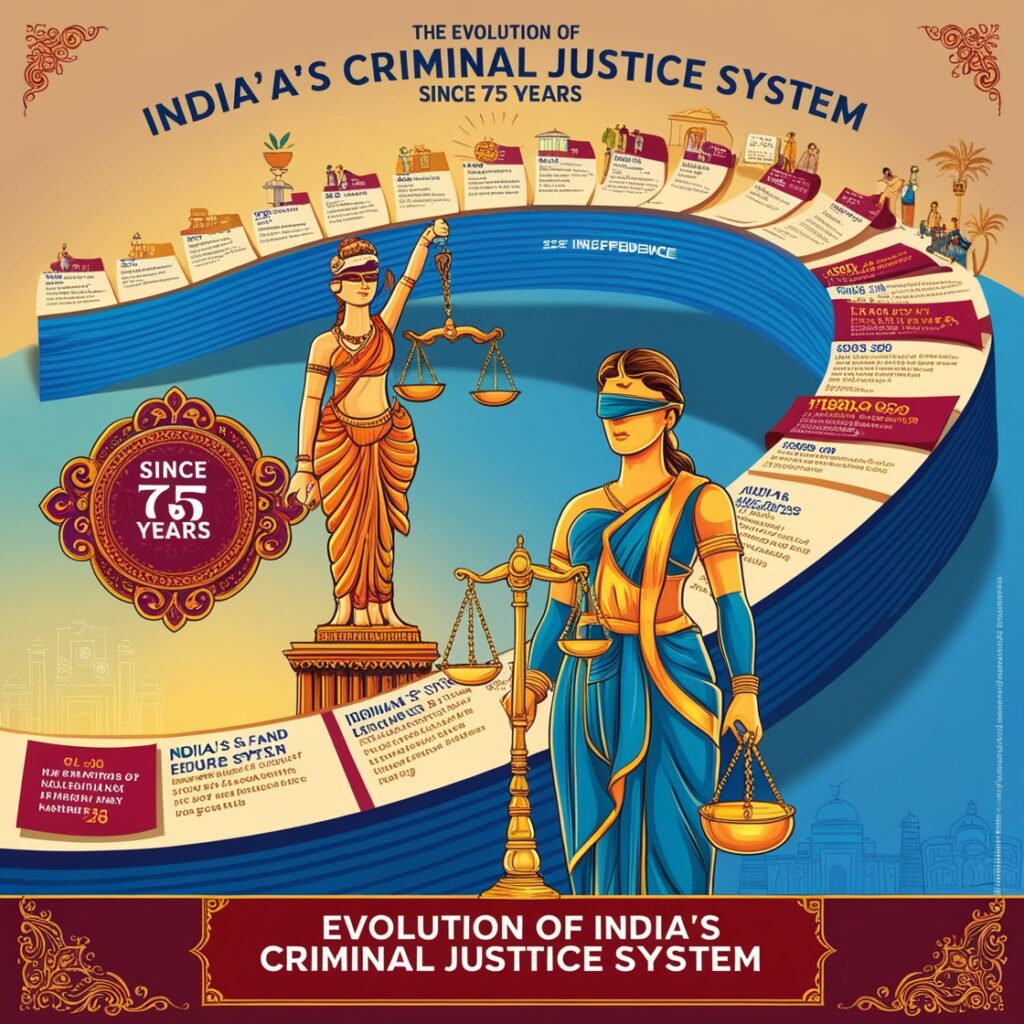Indian Republic at 75: Evolution of the Criminal Justice System

“It is here, that the importance of the judiciary becomes so apparent and that is so when taking into consideration that the judiciary has to decide not only disputes between one individual and another, between one citizen and another but also between a citizen and the State, between one State and the Centre, between all the States on the one side and the Centre on the other and between one individual and the Centre. This gives a wide scope where the jurisdiction of the Court extends, and therefore, the responsibility of the courts becomes all the more important and it has to be realised by courts while giving any decisions.”
-Dr Rajendra Prasad, the first President of Independent India
Seventy-five years have passed since the Constitution of India came into effect on 26 January 1950, making it incumbent on us to revisit the ideals of our democracy, the evolution of the criminal justice system, and the challenges we continue to face as a nation. The evolution of the criminal justice system in 75 years of India’s Republic has resulted from the relationship between the Constitution, criminal procedure, and substantive and procedural law. A comprehensive outlook on criminal law pertains to the proactive role of the Supreme Court compassing a tripartite beginning from being an arbiter between the State and the rich zamindars, post-emergency period of enforcing individual and fundamental rights, and progressively expanding the scope of those rights. As a result, constitutionalism became the fundamental force behind the evolution of the criminal justice system with colonial influence yet consequential progressiveness. Additionally, the constitutional reforms and progressive interpretation of provisions resulted in the empowerment of women, children, and common people.
Every criminal law introduced by the Legislature must pass the test of Article 13, which requires uncompromising compliance with Part III of the Constitution guaranteeing fundamental rights. Articles 17, 19, 21 and 23 regulate the substantial criminal law, and Articles 20, 21 and 22 regulate the criminal procedure. To sum up, Constitution regulates the criminal law by providing the rights against double jeopardy, retrospective criminalization, or enhancement of punishment, the right against self-incrimination, and power against search and seizure. These rights have been developed through years of judicial interpretation, and a proactive role of lawyers, litigants, and civil society. One such example is the landmark judgements on recognizing the Right to a Healthy Environment as part of Article 21.
India’s unique geographical landscape in South Asia in conjunction with the colonial past, with a need to protect national security and sovereignty, led to the adoption of special penal statutes to address the threats emanating from terrorism, trafficking of all kinds, corruption, and money laundering. Through the years the Supreme Court has often turned towards the interpretation of criminal law in favour of public order and social security.
The newly brought criminal laws—Bharatiya Nyaya Sanhita (BNS), Bharatiya Sakshya (BS), and Bharatiya Nagarik Suraksha Sanhita (BNSS)—replaced the Indian Penal Code (IPC), the Code of Criminal Procedure (CrPC), and the Indian Evidence Act of 1872 in 2024. These laws aim to establish a citizen-centric legal framework that prioritizes development, social empowerment, and active community participation within the Indian justice system. So far as the evolution of criminal law is concerned, the Bharatiya Nyaya Sanhita defined the acts of terrorism and organised crime for the first time unlike the Indian Penal Code (IPC).
The criminal law jurisprudence and the relevance of Constitutional foundations become critical when acts such as the Prevention of Money Laundering Act (PMLA), and the Prevention of Corruption Act (PCA) are considered to reverse the burden of proof in trial. Additionally, Unlawful Activities Prevention Act (UAPA), earlier (Terrorist and Disruptive Activities Prevention Act) TADA (1985-1995) and (Prevention of Terrorism Ordinance) POTO (2001); The National Investigation Agency Act, 2008, The National Security Act, 1980, Special Protection Group Act, 1988, Special Public Protection Act (SPPA), Armed Forces (Special Powers) act 1958 (AFSPA), Official Secrets Act, 1923 dilute the Constitutional safeguards in criminal trials and presumption of innocence. The reverse burden of proof is pronounced and the presumption of innocence has been negated by the Supreme Court in a few landmark cases such as Devender Pal Singh v. State (NCT of Delhi) on the alleged destruction of public property and order.
Through Seventy-Five years the Supreme Court aimed to seek truth in the criminal trials to serve the public safety interests. Even though the criminal process seeks to find the “truth” in landmark cases such as the Maneka Gandhi v. Union of India, the Supreme Court does guarantee “fair trial” as a part of Article 21, Right to Life. Additionally, Article 22 of the Constitution relates to an accused person’s right to be informed of the grounds of his arrest, not be denied the right to select and be represented by a Counsel of his choice and be produced before the magistrate within twenty-four hours of being arrested. In the landmark case, DK Basu v. Union of India, the Supreme Court issued the guidelines for arresting a person.
The Constitutional safeguards against the penal nature of criminal law have been diluted by the apex court based on the magnitude of the crime and its huge impact on the economic health and security of the country. Under the economic offences, the Court has demonstrated a reluctance to misplaced sympathy or presumption of innocence as India is a developing country with a majority grappling with socio-economic challenges. In a landmark case, YS Jagan Mohan Reddy v. CBI, the right to bail was diluted and denied by the Court on grounds of huge loss to the country and public funds. Additionally, the Court has developed select principles of bail in criminal law for offences related to terrorism and drug trafficking. In Kartar Singh v. State of Punjab, the Court only permitted bail if there were reasonable grounds to believe that the accused was not guilty and not likely to commit an offence.
The Constitution of India guarantees gender equality in Articles 14, 15 and 16. The evolution of Constitutional Law and the criminal justice system historically favour socially disadvantaged groups guiding the judicial thinking on equality rights. For instance, the Protection of Women Against Domestic Violence Act 2005 (PWDVA) is enacted to protect women’s rights in the institution of marriage. Additionally, the amendment to Section 6 of the Hindu Succession Act led to the overturn of traditional underpinnings of coparcenary by conferring legal rights and liabilities on daughters in the ancestral property equivalent to that of a son. Many other provisions have been enacted and read into by the Courts to promote women’s empowerment in all walks of life including family relations, working rights and reproductive rights.
To add more, the Right to Information is a fundamental right under Article 19(1) of the Indian Constitution and was affirmed by the Supreme Court in the 1976 Raj Narain vs. State of Uttar Pradesh case. The court emphasized that citizens, as masters in a democracy, have the right to know about government functioning. To uphold this principle, the government enacted the Right to Information Act in 2005, providing a framework to exercise this right.
After 75 years of the Constitution of India coming into effect on the Republic Day, criminal law has evolved with the expansion of rights and individual liberty. However, the challenges to criminal justice remain as a result of outdated approaches, rapid advancement in technology, and the transnational nature of the crime being committed. This requires a commitment to Constitutional values, training of law enforcement agencies, lawyers and judges and adopting best practices in criminal law from across the world. India’s criminal justice system continues to serve a complex society in a vibrant democracy with unique opportunities and common challenges that are effectively addressed.

